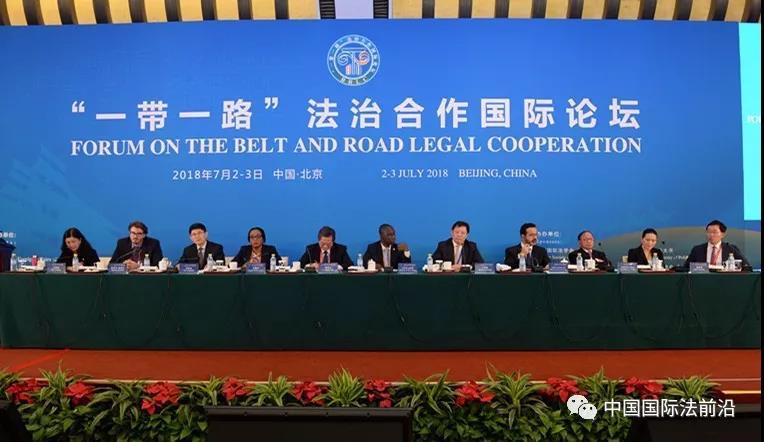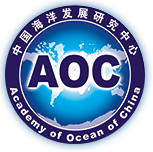
1.2018年7月2日至3日,来自有关国家政府部门、国际和地区组织、私营部门和学术机构的350余名代表相聚中国北京,出席由中国外交部和中国法学会联合举办的“一带一路”法治合作国际论坛,围绕“共建‘一带一路’:规则与协调”主题进行了广泛深入且富有成效的讨论。外交部副部长孔铉佑和中国法学会常务副会长陈冀平担任论坛共同主席。
2.2013年,中国国家主席习近平提出共建“一带一路”倡议。五年来,倡议得到国际社会积极响应和广泛支持,100多个国家和国际组织参与其中,取得丰硕成果。“一带一路”源自中国,但属于世界。“一带一路”建设跨越不同地域、不同发展阶段、不同文明、不同法系,是一个开放包容的合作平台,是各方共同打造的全球公共产品。
3.随着“一带一路”建设不断深入,除了继续加强基础设施等“硬联通”外,各方对规则制度等“软联通”的需求也日益凸显。在此背景下,需要共同探讨“一带一路”法治合作相关问题,为“一带一路”建设提供更好的支撑和保障。
加强“一带一路”建设促进国际法治
4.国际法治是捍卫国家主权、维护世界和平、促进共同发展的重要制度保障,反映了各国对主权平等、和平包容、合作共赢、公正高效等理念和价值的普遍追求。良好的国际法治环境是“一带一路”建设顺利推进的必要前提。
5.共建“一带一路”倡议自提出以来,一直秉持“共商、共建、共享”原则。“共商、共建、共享”原则与以《联合国宪章》为核心的国际法基本原则和国际关系基本准则一脉相承,符合国际法治的精神和要求。
6.法治合作是“一带一路”国际合作中不可或缺的一个重要领域和环节,应在“共商、共建、共享”原则的基础上开展。
7.建议“一带一路”参与方开展多层次、多渠道、全方位的法治合作,共同探索建立合作机制、协商确定合作重点、逐步制定行动计划、有效解决法律问题、不断凝聚共识,为“一带一路”建设夯实法治之基。
8.国际和地区组织拥有机构网络、专业和人才等方面的优势,在“一带一路”法治合作中可以发挥重要作用。建议“一带一路”参与方进一步加强与国际和地区组织在相关领域的合作。
9.我们认为,“一带一路”是践行国际法治的新平台、促进国际法治的新动力。随着“一带一路”建设的不断发展及其法治合作的逐步深入,将从理念和实践层面进一步丰富和充实国际法治,进一步促进国际法治的发展。
遵守和完善有关国际规则体系
10.“一带一路”致力于打造平等互利、开放包容、公开透明的国际合作平台,遵守有关国际公约、双边条约及其他相关国际规则。随着“一带一路”建设的深入发展,也有必要根据实际情况和各方共同需要,不断发展相关规则,逐步推动规则体系的完善。
11.支持“一带一路”参与方结合本国实际情况和发展需要,在借鉴、吸纳国际标准的基础上,加强包括基础设施建设在内的技术标准体系对接和兼容,并在平等基础上共同研究合作标准,进一步推进“一带一路”国际合作走向深入。
12.认识到贸易和投资作为经济增长引擎的关键作用,呼吁各方通力合作,维护多边贸易体制,避免并反对一切形式的单边主义和贸易保护主义。支持“一带一路”参与方缔结贸易和投资协定,促进贸易和投资自由化和便利化,进一步放宽市场准入,逐步减少和消除贸易和投资壁垒。
13.支持“一带一路”参与方推进金融、税收、交通运输、知识产权、环境保护、劳工、反恐和打击跨国犯罪等领域的法律合作,为“一带一路”构建稳定、公正、透明、非歧视的规则和制度框架。
14.支持“一带一路”参与方积极开展多边和双边会计审计监管合作,推动会计审计标准趋同和监管等效,为跨境投融资活动和金融市场的互联互通提供基础设施保障。
15.鼓励“一带一路”参与方在国际民商事通行规则的基础上,加强民商事法律法规领域的合作,减少相互之间的法律冲突。
16.鼓励“一带一路”参与方加强在签证、通关等领域的规则协调与合作,便利跨境人员与物资往来。
17.呼吁“一带一路”参与方携手加强“一带一路”廉洁建设,鼓励以《联合国反腐败公约》等国际公约和相关双边条约为基础开展反腐败合作,将“一带一路”建成廉洁之路。
积极预防和妥善解决有关争端
18.积极化解“一带一路”贸易和投资争端,平等保护各方当事人合法权益,营造稳定公平透明、可预期的法治化营商环境,对于“一带一路”建设具有重要的保障作用。
19.建议“一带一路”参与方积极开展法律风险防范合作,有效预防争端。
20.支持“一带一路”参与方加强协商合作,积极运用现有国内、国际争端解决机制或机构解决争端。探索建立符合“一带一路”实际需要的争端解决机制或机构,包括研究建立以条约为基础的国际机制或机构的可行性,预防和解决相关争端。
21.支持“一带一路”参与方深化司法执法领域合作,包括探讨加强民商事判决相互承认和执行、促进民商事司法文书送达及调查取证的合作机制等。支持“一带一路”参与方加强调解、仲裁等非诉纠纷解决领域的交流合作。
22.倡导公正、高效、便利地解决争端,赞赏相关国家探索建立诉讼、调解、仲裁有效衔接的多元化纠纷解决机制所做的努力。
深化“一带一路”法治交流
23.鼓励“一带一路”参与方、国际和地区组织、社会团体、学术界等开展多元化的法治交流,分享良好做法和最新实践,推进法律制度、法律文化和法律教育领域的合作。
24.支持“一带一路”参与方法律服务业加强相互沟通与交流,通过多种形式推进跨境合作,为政府和企业提供更加优质、高效的法律服务。
25.鼓励“一带一路”参与方、国际和地区组织、社会团体、研究机构和私营部门共同参与“一带一路”法治人才培养,并积极开展法治能力建设合作。
26.欢迎中国出资实施“‘一带一路’法治合作研修项目”,以支持“一带一路”参与方深入开展法律交流和能力建设。
27.鼓励“一带一路”参与方加强法律信息和实践交流机制建设,探索建立外国法查明在线共享平台和司法案例交流平台等。
28.鼓励“一带一路”参与方积极建设条约数据库,为公众查阅相关国家缔结和参加的双多边条约提供便利。
愿景展望
29.我们建议,未来通过适当形式继续开展对“一带一路”法治合作问题的交流讨论。
30.我们呼吁,尊重《联合国宪章》宗旨原则和国际法,在“共商、共建、共享”基础上,推进“一带一路”法治合作;积极为构建人类命运共同体,建设持久和平、普遍安全、共同繁荣、开放包容、清洁美丽的世界贡献力量。
Statement of the Co-Chairs of the Forum on the Belt and Road Legal Cooperation
1. During 2 and 3 July 2018, over 350 delegatesfrom governments, international and regional organizations, private sectors andacademic institutions attended in Beijing, China the Forum on the Belt and RoadLegal Cooperation jointly held by the Ministry of Foreign Affairs of China andChina Law Society, with Mr. Kong Xuanyou, Vice Minister of Foreign Affairs ofChina, and Mr. Chen Jiping, Executive Vice-President of China Law Society, asCo-Chairs of the Forum, and conducted extensive, in-depth and productivediscussions under the theme of “JointlyBuild the Belt and Road: Rules andCoordination”.
2. In 2013, President Xi Jinping put forward theBelt and Road Initiative (BRI). Five years on, this Initiative has receivedpositive response and broad support from the international community. Over 100countries and international organizations have participated in this Initiativeand have already achieved productive outcomes. The BRI is a Chinese proposalfor the world. It has become a platform for open and inclusive cooperation anda global public good jointly developed by parties from different regions, atdifferent development stages, and across different cultures and law systems.
3. As the BRI continues to develop, in addition tostrengthening “hard” connectivity in physical infrastructure, there is agrowing need for “soft” connectivity in legal infrastructure, rules andregulations. In this context, it is necessary to come together to discussissues concerning legal cooperation, in order to provide better legal supportand safeguards for the BRI.
Promoting international rule of law by enhancing cooperation under the BRI
4. The international rule of law is an importantinstitutional guarantee for upholding state sovereignty, maintaining worldpeace and promoting common development. It reflects the shared pursuit by allcountries of such ideas and values as sovereign equality, peace, inclusiveness,win-win cooperation,fairness and effectiveness. A sound legal environment is an essentialprerequisite to the smooth progress of the BRI process.
5. Since its very inception, the BRI has alwaysfollowed the principle of “extensive consultation, joint contribution andshared benefits”, which is consistent with the fundamental principles ofinternational law and the basic norms of international relations with the UNCharter as the core.
6. Legal cooperation, as an indispensable field ofand link for international cooperation under the BRI, should be developed onthe basis of the principle of “extensive consultation, joint contribution andshared benefits” as well.
7. It is recommended that all parties participatingin the BRI develop multi-level, multi-channel and comprehensive legalcooperation by exploring the establishment of cooperation mechanisms,identifying priorities through consultation, making action plans progressively,solving legal issues effectively and building consensus constantly, in order tolay a solid legal foundation for the BRI.
8. International and regional organizations have animportant part to play in legal cooperation under the BRI, with their strengthsin institutional networking, expertise and human resources. It is recommendedthat the parties participating in the BRI further strengthen cooperation withthese organizations in relevant fields.
9. We believe that the BRI provides a new platformfor implementing and a new momentum for promoting the international rule oflaw. As the BRI and the related legal cooperation continue to develop, theinternational rule of law will be improved and enriched, both in theory and inpractice.
Abiding by and improving relevant international rules-based systems
10. The BRI aims to provide a platform forinternational cooperation characterized by equality, mutual benefit, openness,inclusiveness and transparency, and on the basis of international conventions,bilateral treaties and other international rules. As the BRI continues todevelop, it is necessary to develop new rules and improve the rules-basedsystems in accordance with the circumstances and needs of all parties.
11. We support the parties participating in the BRIin their efforts to enhance the connectivity and compatibility betweentechnical standards systems in the construction of infrastructure and otherfields. They should take account of their particular circumstances and theirdevelopmental needs, draw upon applicable international standards, and explorejointly and on equal footing the proper standards for cooperation, in order todeepen international cooperation under the BRI.
12. In recognition of the crucial role of trade andinvestment in driving economic growth, we call for concerted efforts by allparticipants, in order to uphold the multilateral trading system and avoid andoppose any form of unilateralism and trade protectionism. We support theparties participating in the BRI in their efforts to conclude agreements ontrade and investment, to promote trade and investment liberalization andfacilitation, increase market access, and gradually reduce and eliminatebarriers to trade and investment.
13. We support the parties participating in the BRIin their efforts to promote cooperation on laws related to financing, taxation,transportation, intellectual property rights, environmental protection, labor,anti-terrorism, the fight against transnational crimes and so on, so as tobuild a framework of rules and systems for the BRI that would featurestability, fairness, transparency and non-discrimination.
14. We support the parties participating in the BRI in their efforts to conduct multilateral and bilateralcooperation on accounting and auditing supervision, and to harmonize standardsand provide equivalency in accounting and auditing, in order to providestructural safeguards for cross-border investment and financing activities andfinancial market connectivity.
15. The parties participating in the BRI areencouraged tocooperatein areas of civil and commercial laws and regulations on the basis ofinternational general practice in civil, commercial matters, in order to reduceconflict of laws.
16. The parties participating in the BRI areencouraged to enhance cooperation on rules related to visa application andcustom clearance, in order to facilitate cross-border movement of people andgoods.
17. We call on the parties participating in the BRIto jointly strengthen anti-corruption cooperation, on the basis of the United Nations Convention against Corruptionand other international conventions as well as bilateral treaties, inorder to ensure integrity in the BRI process.
Actively preventing and properly settling disputes
18. As an essential safeguard for the BRI, effortswill be made to settle trade and investment disputes in the implementation ofthe BRI projects, fairly protect the legitimate rights and interests of allparties, and foster a business environment under the rule of law featuringstability, fairness, transparency and predictability.
19. We recommend that the parties participating inthe BRI work together to prevent legal risks and avoid disputes effectively.
20. We support the parties participating in the BRIin their efforts to strengthen consultation and cooperation and resolvedisputes through existing domestic and international dispute settlementmechanisms or institutions. Efforts should be made to explore the feasibilityof establishing dispute settlement mechanisms or institutions that meet theneeds of the BRI, includingfurther discussion on establishing, if appropriate, treaty-basedmechanisms or institutions, to prevent and resolve disputes.
21. We support the parties participating in the BRIin their efforts to deepen cooperation in judicial affairs and law enforcement,including exploring the establishment of cooperation mechanisms to strengthenmutual recognition and enforcement of judgments in civil and commercial mattersand to promote service of judicial documents as well as investigation andevidence collection in civil and commercial matters. The parties participatingin the BRI are encouraged to strengthen exchanges and cooperation regarding theways and means of settling disputes other than by judicial settlement, such asmediation, arbitration and so on.
22. We stand for the settlement of disputes in anequitable, efficient and convenient way and appreciate the efforts made bycountries to explore the establishment of diversified mechanisms of dispute settlementthat allow judicial settlement, mediation and arbitration to play theirappropriate and effective roles.
Advancing legal exchange under the BRI
23. Parties participating in the BRI, internationaland regional organizations, civil society and the academia are encouraged toconduct diversified legal exchange, share good and latest practices andfacilitate cooperation in areas relating to the legal system, legal culture andlegal education.
24. The legal service industries in the partiesparticipating in the BRI are encouraged to strengthen consultation and exchangeof information and to promote cross-border cooperation, so as to provide highquality and efficient services to governments and enterprises.
25. Parties participating in the BRI, internationaland regional organizations, civil society, research institutions and theprivate sectors are encouraged to jointly work on training legal professionalsand capacity building.
26. We welcome China’s provision of funding toimplement the “Belt and Road Legal Cooperation Research and TrainingProgramme”, in order to support legal exchange and capacity building among theparties participating in the BRI.
27. The parties participating in the BRI areencouraged to develop mechanisms to exchange legal information and practicedata, such as establishing an online platform for foreign law ascertaining andsharing, and an exchange platform on judicial cases.
28. The parties participating in the BRI areencouraged to jointly establish a database, for public access, of bilateral andmultilateral treaties concluded and acceded to by the parties participating inthe BRI.
Way forward
29. We suggest that further discussions under thetheme of the BRI legal cooperation be conducted in appropriate forums in thefuture.
30. We call for respect for the purposes andprinciples of the UN Charter and international law, and for advancement of theBRI legal cooperation on the basis of extensive consultation, jointcontribution and shared benefits. We also call for contribution to building aCommunity with a Shared Future for Mankind and a world that enjoys enduringpeace, comprehensive security, and common prosperity, and is open and inclusiveas well as clean and beautiful.
文章来源:中国国际法前沿


